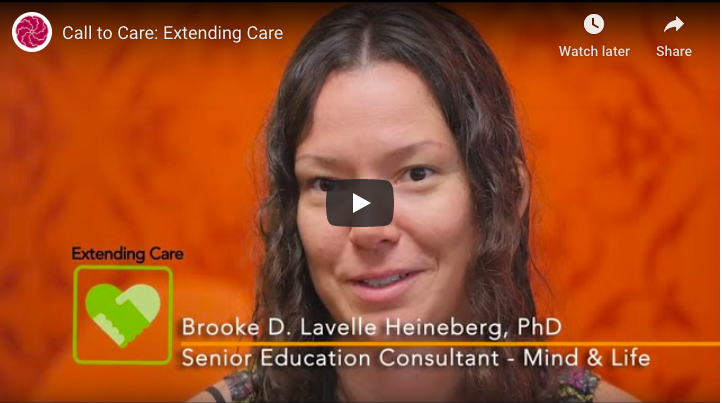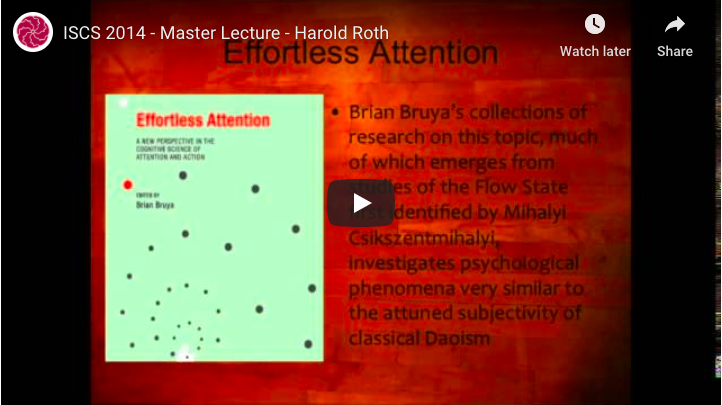Filmed during Mind & Life Institute’s “Mind & Life XXX: Perception, Concepts, and Self” on December 14, 2015. Perception, Concepts and the Self: Perspectives from Western Science and PhilosophySPEAKERS: His Holiness the Dalai Lama, Richard J. Davidson & Jay Garfield We introduce the central themes of this meeting, discussing from scientific and philosophical perspectives the …
Topic Archives:
Call to Care: Extending Care
Attachment Theory and Attachment Security in Relation to Buddhist Non-Attachment
The ideal mental state, or stance, according to attachment theory and research is secure attachment or attachment security. The ideal state, or stance, according to Buddhism has been often been described as non-attachment. I will present some ideas and measures, including measures of attachment anxiety and avoidance, mindfulness, and non-attachment, in hopes of sparking theoretical …
Continue reading “Attachment Theory and Attachment Security in Relation to Buddhist Non-Attachment”
Fear and Trust: A Multidisciplinary Overview
This presentation will provide an overview of themes to be considered throughout this Summer Research Institute. It will begin with a consideration of fear from a psychological perspective, particularly emphasizing the process and psychophysiological correlates of threat appraisal and how this is influenced by the perception of personal coping resources (e.g., in self-concept and self …
Continue reading “Fear and Trust: A Multidisciplinary Overview”
Concurrent Session 5 – Self, Nonself, and Silencing the Self: Dangers and Possibilities
This presentation brings Buddhist teachings on anatta to research findings based on the Silencing the Self Scale to examine central concepts of self and selflessness from Buddhist and Western psychological perspectives. Anatta, realized through meditation, insight, and teachings, is an essential aspect of the Buddha’s teaching on liberation from suffering. In contrast, selflessness, and self-silencing, …
Concurrent Session 3 – Being in the Body: Contemplative Practice, Interoceptive Awareness, and Health
Interoception, awareness of one’s body, informs our sense of being in the world.Over time, we form associations between experiences and embodied responses,creating a set of expected body responses. While these expectations allow for rapid, proactive responses to life’s challenges, they can also mask unexpected embodied feelings. Meditation often contains an interoceptive focus such as breath …
Concurrent Session 3 – Meditation, Ecology, and Subjectivity: Performing Entangled Selves
The main goal of this presentation is to explore the entanglements betweentechnologies of the self and ecology. I am particularly interested in the ways in which the modern self — characterized by Elias as the homo clausus and by Watts as the skin-encapsulated ego — can be suspended, eroding the dualism between self and others, …
Concurrent Session 3 – Spiritual Well-Being in Historical Perspective
Over the past 20 years, there has been a growing interest in economic and psychological studies of happiness through the concept of “subjective well-being.” Contemplative studies can also be situated within this history, insofar as it is indebted to mindfulness studies, Buddhist modernism, and thus the twin goals of minimizing suffering and enhancing well-being. Contemplative …
Continue reading “Concurrent Session 3 – Spiritual Well-Being in Historical Perspective”
Master Lecture – Science, Daoism, and Scholarly Subjectivity
The Classical Daoist tradition in China, known through its two famous “mystical” works, the Daodejing («The Way and its Potency») and the Zhuangzi («Teachings of Master Zhuang”), provides specific advice about forms of contemplative practice that develop qualities of selfless and impartial cognition thus enabling accurate perceptions, judgments and spontaneous intuitions to be made about …
Continue reading “Master Lecture – Science, Daoism, and Scholarly Subjectivity”
ISCS 2014 – Master Lecture – Harold Roth
Science, Daoism, and Scholarly Subjectivity



